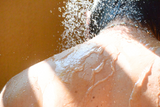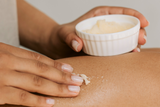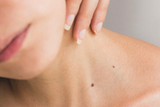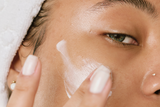Easy Peasy You
Perioral Dermatitis Diet: Eat Anti-Inflammatory
Posted by Lara Schimweg on
What influence does diet have on perioral dermatitis?
Perioral dermatitis is triggered by stress and, above all, by over-care of the skin. At first glance, that doesn't sound like it has much to do with diet. However, diet almost always plays a role when something in our body is out of balance.
In the early stages of perioral dermatitis, irritation is usually visible around the mouth and nose. Later, perioral dermatitis can spread to the entire face. Since skincare products are also a cause, they are usually ineffective in treating the condition. Therefore, it's important to implement a zero-product regimen, in which you completely abstain from skincare and makeup for a certain period. This zero-product regimen can be difficult to maintain because your intuition tells you, "You have to do something about it!" That's why we also have an article for you with tips on how to make the zero-product regimen easier to stick to .
Perhaps it will help you to know that you can do something for your body from the inside out. Your skin is inflamed, and anti-inflammatory foods can help. Incidentally, this isn't only beneficial during perioral dermatitis. A healthy, varied, and balanced diet is good not only for the skin but for the entire body.
Perioral dermatitis diet: Here's what you can do specifically
Reduce sugar
Reduce your sugar intake. This doesn't mean cutting out sweets completely. As with everything, moderation is key. Enjoy your chocolate cookies when you feel like it.
If you think you've already replaced your refined sugar with "healthy sugar," we probably have some bad news. Brown sugar, agave syrup, honey, dried fruit, coconut sugar, and the like are also sugars. If you feel better with brown cane sugar or coconut sugar, that's perfectly fine. But for the body, it is and remains sugar, whether refined or not. It raises your insulin levels. Be especially careful if you want to replace refined sugar with dried fruit like dates. They contain a lot of fructose, which could lead to fatty liver disease. The consequence could be diabetes. If you enjoy some dried fruit now and then, by all means, enjoy it. However, you shouldn't replace sugar with it. A healthy alternative to sugar is inulin. Inulin is extracted from chicory and doesn't raise insulin levels because it contains a lot of fiber. And the best part: inulin is good for your gut microbiome. You'll find out why in the next section.
Perioral dermatitis: Nutrition for a healthy gut
Do you regularly eat (vegan) yogurt and fermented foods?
If you haven't tried it yet, now's a great time to start. Kimchi, fermented rice, kombucha, and (vegan) yogurt all contain beneficial bacteria that strengthen your gut flora. For these good bacteria, which you ingest through food, to thrive, they need the right food. This can be found in fiber-rich vegetables, legumes, and whole grains. You can also incorporate inulin into your diet. For example, you can use it to sweeten yogurt, and it provides your gut with additional fiber.

Tip: Don't overdo it with fermented foods and fiber at the beginning. Your gut needs time to adjust. You might experience some bloating at first, but that's nothing to worry about.
But always remember, everyone is different. Just as your skin reacts differently, so too can your gut. Some people can never eat a raw salad in the evening because they have a sensitive gut or perhaps an inflammatory bowel disease. The goal isn't to eat as much raw vegetables as possible. Raw food isn't even the healthiest diet for your gut. Gentle cooking and steaming are ideal. This way, the vitamins are preserved and your gut isn't overwhelmed by the extremely high fiber content of raw food.
Perioral dermatitis: Diet with anti-inflammatory fats
What kind of oils do you usually cook with?
Cooking oils like sunflower and safflower oil aren't the best. It's much healthier to heat food with olive oil. However, never let cold-pressed olive oil get too hot. Steaming and gentle cooking are perfectly fine. For frying, you can occasionally use sunflower, safflower, or even coconut oil. All of these oils can be heated to very high temperatures. But don't overdo it with coconut oil. As with everything, the dose makes the poison.
Cold-pressed, anti-inflammatory oils like walnut oil, hemp oil, and flaxseed oil can be wonderful additions to your diet. Try adding a few drops of flaxseed oil to your yogurt or drizzling a little walnut oil over savory dishes. However, you should never heat these oils. They are ideal for cold dishes.
If you eat fish, you can benefit from the omega-3 fatty acids it contains. These inhibit inflammation throughout the body. A plant-based alternative is flaxseed oil. However, plant-based omega-3 is not as readily absorbed by the body as that from wild-caught fish. This is, however, a matter of ethics. If your primary concern is the environment, it makes sense to look for relevant certifications when buying fish.
Tea for the skin
Our Phyto Clear tea contains many antioxidants and secondary plant compounds. The spearmint has a hormone-balancing effect.
Tip: Eat an anti-inflammatory diet
- Reduce sugar
- Fermented foods: e.g., kimchi, fermented rice, kombucha, or yogurt
- Foods high in fiber: e.g., vegetables, legumes, whole grain products or inulin
- Anti-inflammatory oils and fats: e.g., olive oil, walnut oil, hemp oil, linseed oil, and fish.
What can I expect from a healthy diet if I have perioral dermatitis?
A healthy diet can reduce inflammation and support healing. However, don't expect this to allow you to quickly discontinue your zero-therapy regimen. It's important to consistently follow the zero-therapy regimen and then continue with gentle skincare free of fragrances and irritating ingredients , avoiding irritating products altogether.
A healthy diet will not only help with your perioral dermatitis. Primarily, you'll feel fitter and prevent illnesses and deficiencies. There's much more to say about nutrition. We'll also include some articles and quick, healthy recipes.
← Older Post Newer Post →
0 comments









